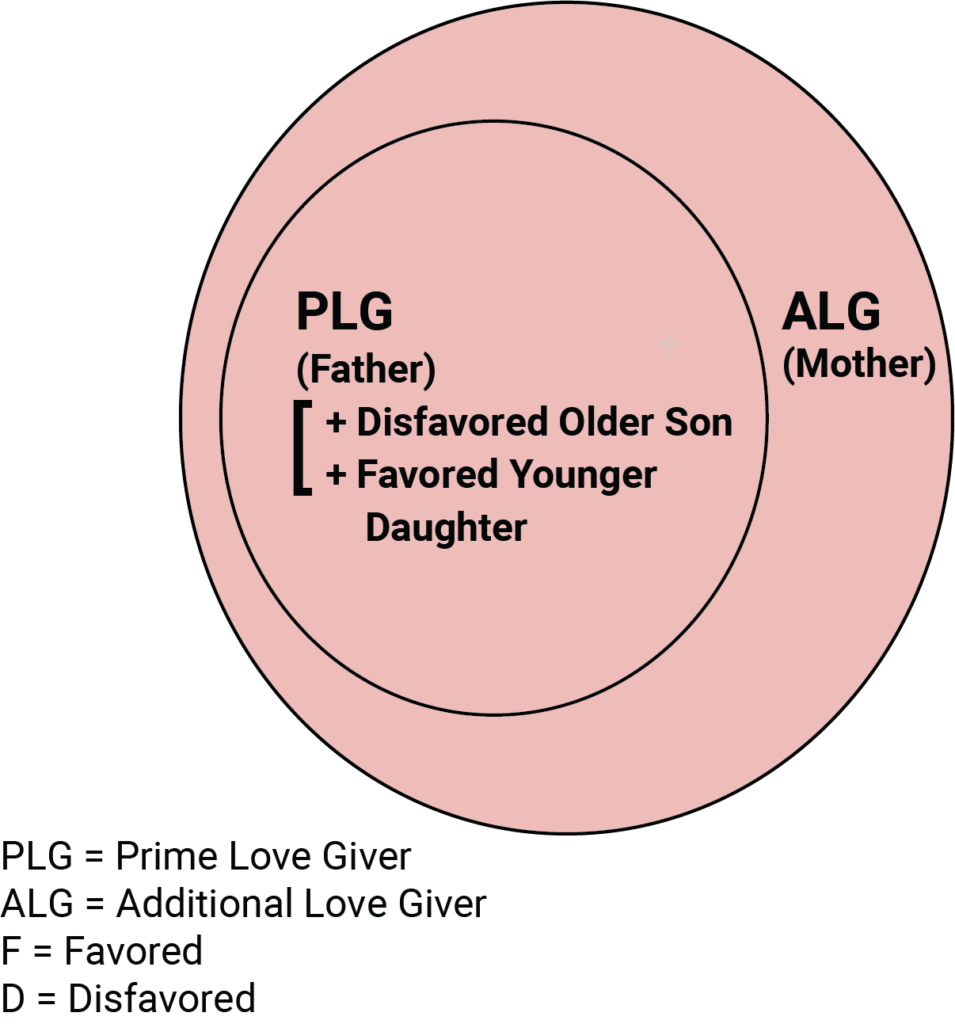A gentleman came into my office, and after seating himself, said: “I have a problem but it’s not about me – it’s about my kids.” He related that he has two children: a nine-year-old son who is well and attends fourth grade and a five-year-old daughter who is disabled. He indicated his daughter is in a wheelchair and needs her parents’ constant care and attention, but added that she is a good-natured little girl and relatively easy to handle considering her severe physical condition. He said she is not the main problem since his wife stays home to look after her, but that his son is a problem because he is defiant and uncooperative. He explained that his son doesn’t seem to understand that his little sister has serious challenges that require the help of all the family members. Although most of the fights in the home were taking place between his wife and his son, he narrowed the problem down to a dispute between himself and his wife, since they were in severe disagreement about how they should treat their uncooperative son, and especially, about how much they should expect from him.
As per standard DOLIF protocol, I first looked to identify the Prime Loving parent, or PLG. When I asked for some details about the situation, this young man explained that his wife felt their son should be more responsible and helpful, and participate in some of the care-giving duties for his sister, such as help carry the wheelchair or watch her while the mother was busy. She also felt he should be more diligent about doing household chores like taking out the garbage or tidying up. At the same time, this father noted that his son was becoming increasingly distant, escaping to his room to lie on his bed and brood or watching TV, and at times refusing to do as he was told. He also mentioned that the boy was more irritable and that his schoolwork was beginning to falter. He said that in contrast, his daughter was usually in a good mood and sweet-tempered, that her eyes would light up when he came home and that he could always bank on a smile from her, which warmed his heart.
I suspected that this gentleman was the PLG because of his concern and because he had described his relationship with his daughter as very warm. But seeking to make sure, I asked whether he or his wife was the more easy-going, indulgent parent, to which he unhesitatingly responded that she was of a more organized, disciplinarian and demanding nature. He noted she was always looking for cleanliness and order and would become upset with their son if he didn’t pitch in to help, which would start them fighting. His own feeling was that his wife was expecting too much of their son, as he remarked: “I keep telling my wife “I think he just doesn’t get it”, adding “do you know what I mean?” In saying this he explained he meant he felt his son was still too young and immature to understand the importance of their daughter’s needs, or to have any real sympathy with her situation. Although he agreed that his son should do chores around the house that would normally be done by a boy his age such as clean up his room, put out the garbage or clean the table after dinner, he felt his son was still a child himself, and too young to fully appreciate his parent’s concerns. He believed, as he argued with his wife, that too much pressure was being put on his son.
It was clear to me now that this gentleman was PLG, which placed his wife in the role of ALG. Next, evidence about which child was Favored in this family and which one Disfavored had come when he spoke affectionately about his little handicapped daughter, who was happy to see him come home every evening, as he was to see her. This meant there was a warm relationship between father and daughter, confirming the PLG-Favored child attachment between them. Armed with this information, I could now advise this young man on how to manage his family situation so that tempers could cool down and he could keep his marriage on track.
I began by acknowledging his closeness and deep LOVE for his disabled daughter. He smiled and nodded, and I could see that his body became relaxed because this statement made an immediate connection with his most basic Emotions. He gave a deep sigh, but on allowing himself to reflect for a moment, began to shed some tears. For a while he expressed his sadness at his daughter’s condition and how difficult it was to carry on a normal family life. After discussing his disappointment and pain over the situation with his daughter, we returned to the main subject of his son. He expressed that he fully understands his son’s objections to being asked to help look after his sister, noting: “If I were his age, I wouldn’t want to babysit my little sister either.” He seemed to understand that the boy was still too immature to fully appreciate his parents’ point of view.
Since this gentleman seemed very approachable and had good insight into the feelings of all the family members, I felt I could be frank and honest with him, and advise him directly without couching my statements. I therefore undertook to explain the standard DOLIF analysis of Emotional dynamics of a 2-child family as it applies to his case:

I said I understood his daughter is a pleasant, mild-tempered child, and that his son is more stubborn and difficult to handle, BUT THAT THIS IS NOT BECAUSE OF THEIR GENES, nor because their daughter “takes after” her father, while their son “takes after” his mother. I explained that the reason her behavior is docile and lovable is that she is the recipient of a greater amount of Love from him as PLG. On the other hand, I noted that his son is currently experiencing a shortage of Love by comparison, and therefore undergoing significant Anxiety and Anger. These negative feelings, as well as his bad behavior in general, were aroused in reaction to his sense that he is Disfavored compared with his little sister who, unusual though it may seem because she is disabled, is the Favored child in this two-child cluster. I explained that this situation was causing his son to be jealous of the Love, attention and social acclaim that his sister was enjoying, and that this was causing the boy to feel alienated, unloved and left out of both the smaller and larger family group Circles of Love.
I also took pains to explain that this was NOT his fault, but the usual way children divide themselves in a normal nuclear family, since families inevitably become divided as a result of the ongoing Sibling War that the children wage. I instructed him in the invisible underground economy of Love in families, and informed him that children’s greatest quest is to seek primacy with their PLG, who happens, in this case, to be himself and not their mother, which is normal too.
My advice to this gentleman then was that he should try to loosen his Emotional ties with his daughter, while at the same time making sincere attempts to strengthen his relationship with his son. I acknowledged that this may not be an easy thing to accomplish, since he must at the same time be committed to helping his daughter navigate within her limitations. I suggested he accomplish this task by spending more time doing father-son activities, paying attention to and indulging his son’s feelings, wants and needs, helping him with homework, keeping in touch with his friends, teachers and school life, and generally taking a greater interest in his son’s life. I made sure he understood that this should be done with the main underlying goal of giving his son the sense of personal respect and the security of knowing that he is an important entity, both within the family, and outside. I informed him that especially as his parents, they should both, but himself in particular as PLG father, make a point of listening to their son and taking his feelings, opinions and ideas into serious consideration, and acting on at least some of them. I told him that this was the road to increasing the boy’s overall social status in the family, and ultimately his self-confidence.
I told this gentleman I recognized that he would have to navigate the thin line between his son and his wife in such a way as to be giving more attention to his son while keeping his wife’s objections at bay for a while. I assured him however that this situation would soon change, as long as he keeps giving his son the greater attention he craves. By means of this tactic of sharing more LOVE with him, his son’s Anger and Anxiety would soon abate and he would become more mellowed, compliant and willing to surrender his oppositional attitude.
In addition, I explained to this gentleman the secondary advantages he and his family would gain from these changes. First, since his son’s Anxiety would be lessened, the boy would become more settled in his thoughts and feelings, do better in school, and be easier to get along with both at home and in school. Second, he would be forming a new alliance with his son, who will soon be old enough to decide his own future. This would create a better chance that his son will not continue to build up Anger toward the family members and stray from the family fold as a teenager. Third, his family situation would settle down due to fewer incidents of fighting between mother and son, giving him and his wife more peace of mind. Fourthly, I alerted him that since he really has only one well child, he should work on building a friendship with his son that will last into his old age. This would provide the potential of giving both him and his wife grandchildren to build a family clan for their future. Finally, I let him know that the likelihood that his son and daughter will get along as siblings in the future will be greatly enhanced, a factor that will certainly enhance the chances that his son will grow up with a positive attitude toward her and be willing to help look after her once he and his wife are gone.
The course of treatment was then ended after two sessions.

